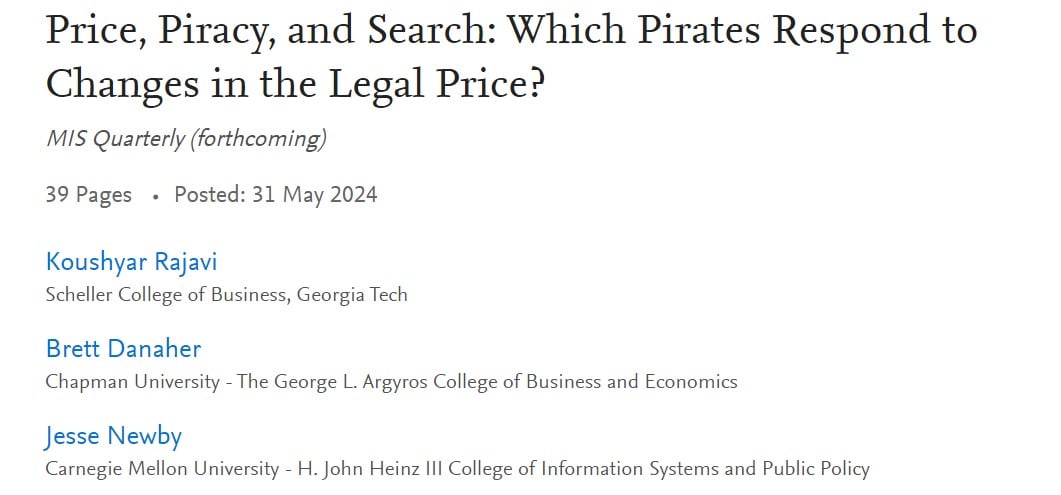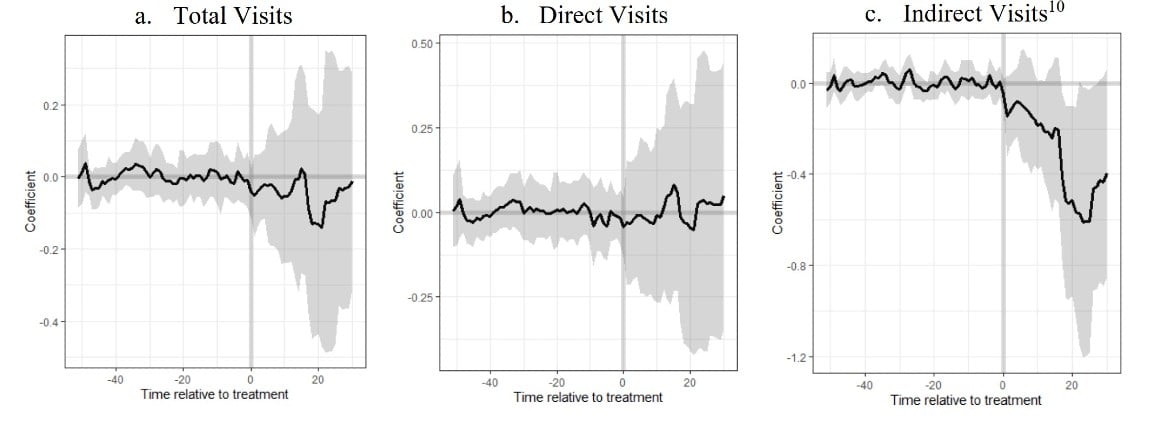 Most people know all too well that downloading and sharing pirated content is against the law. Nonetheless, millions do so daily.
Most people know all too well that downloading and sharing pirated content is against the law. Nonetheless, millions do so daily.
There’s no denying that piracy affects legal sales to some degree. That said, piracy is a complicated phenomenon and the reported effects are not always straightforward.
Instead of trying to quantify the prospected losses in yet another study, researchers from Georgia Tech, Chapman University, and Carnegie Mellon University, posed a different question.
Do price reductions for legal content have an effect on piracy?
Price and Piracy
Various surveys have indicated that many people cite high costs as a prime reason to pirate, so it’s any area worth researching. Doing so elegantly is not easy, however, as researchers can’t simply ask sellers to change their pricing. Luckily, a natural experiment with help from updated EU tax regulations provided an opportunity.

In 2018, the European Union passed a directive that allowed member states to reduce the VAT on e-books, bringing it in line with the lower tax rate for physical books. This change was implemented by several countries in 2019, including Ireland, where e-book prices dropped 14%.
The researchers used this natural variation to examine the effect on piracy. Specifically, they looked at visits to publishing related pirate sites in Ireland after this change was implemented, comparing it to the EU countries where prices remained unchanged in the same period.
If cheaper prices matter, traffic to pirate sites should drop in Ireland. The 14% price decrease is relatively minimal, but the effect was indeed noticeable.
Direct Pirate Site Visits Unchanged
The researchers relied on pirate site ‘visits’ data from tracking company MUSO and, at first glance, there weren’t any major changes. The lower prices didn’t result in fewer direct visits to book pirate sites.
“We find that direct eBook piracy is not affected by the decrease in the price of eBooks that resulted from lowered tax rates,” the researchers write.
The term direct traffic applies to visitors who go to these pirate sites directly. For example, by typing the address into the browser directly or through a bookmark. These people are already familiar with the pirate sites, and price reductions don’t impact their habits.
Fewer Indirect Pirate Site Visits
In addition to direct visits, MUSO also records indirect traffic. This refers to visits coming from search engines such as Google, or from sites that link people to these pirate sites in other ways. These indirect visitors are impacted by price reductions, the research found.
The data show that, compared to other countries, indirect visits to book pirate sites in Ireland decreased significantly as e-book prices were dropped.
“[W]e find evidence that these price decreases reduced indirect eBook piracy visits by at least 27%, an effect that starts smaller and grows larger over time as indirect pirates become aware of the lower prices.”
As mentioned, this effect became stronger as time passed. According to the researchers, it’s likely that it took some time for people to learn about the price drops, which would explain this gradually increasing reduction.
Hardcore vs. Casual Pirates
The researchers found that cheaper prices decrease indirect traffic to pirates sites, while direct visits are not affected. The researchers mention a few possible reasons for this distinction.
Broadly speaking, direct pirates can be considered more hardcore. Piracy is ingrained in their system, they have their favorite sites, and small price reductions generally don’t impact their behavior.
“Because pirates who navigate directly to piracy sites have already paid the fixed search and learning costs for piracy, the legal price is of little interest to them, nor are they likely to notice changes in this price since they do not search.
“Indeed, for these pirates, there seems to be some truth to the adage ‘you cannot compete with free’,” the researchers add.
Casual pirates who use search engines to find free books are easier to sway. Since they search, they are more likely to notice the price differences in the first place. The results of the study suggest that these ‘indirect’ pirates weigh both legal and illegal options, and are willing to pay if the price is right.
Implications
This is just a single study that has to be replicated by future research, also in other countries and across other content categories. That said, there are some provisional lessons to draw.
The researchers suggest that casual pirates, who use search engines to visit pirate sites, may be the best group to target and convert. For example, by offering discount coupons to draw them to legal platforms.
More hardcore pirates, who directly visit pirate sites, are not likely to be lured by cheaper offers. They will pirate if they get the chance.
“Our results demonstrate the potential of using price to mitigate piracy, but they also highlight the challenges firms face in competing with piracy for experienced pirates,” the researchers conclude.
—
The article will be published in a forthcoming edition of the peer-reviewed journal MIS Quarterly. An early copy is available on SSRN.
Rajavi, Koushyar and Danaher, Brett and Newby, Jesse, Price, Piracy, and Search: Which Pirates Respond to Changes in the Legal Price? (February 01, 2024). MIS Quarterly (forthcoming).
- SEO Powered Content & PR Distribution. Get Amplified Today.
- PlatoData.Network Vertical Generative Ai. Empower Yourself. Access Here.
- PlatoAiStream. Web3 Intelligence. Knowledge Amplified. Access Here.
- PlatoESG. Carbon, CleanTech, Energy, Environment, Solar, Waste Management. Access Here.
- PlatoHealth. Biotech and Clinical Trials Intelligence. Access Here.
- Source: https://torrentfreak.com/cheaper-prices-reduce-indirect-visits-to-pirate-sites-research-finds-240609/




